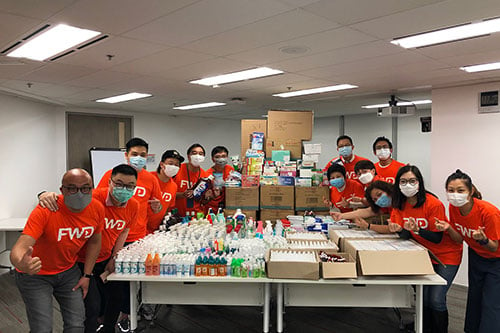

FWD Hong Kong’s tied agency force and staff helped collect almost 6,000 sanitation and protection supplies to benefit four charities.
FWD Hong Kong, through its tied agency force and corporate staff, has collected and donated various sanitation and protection supplies for four charities which serve vulnerable groups such as cancer patients, the visually impaired, elderly, and underprivileged communities.
Over the past two weeks, the insurer collected and quality-checked almost 6,000 items, including surgical masks, hand sanitisers, disinfectant alcohol, disinfectant wipes, bleach, and cleaning supplies, according to a statement. These supplies will be donated to the following organisations:
Cancerinformation.com.hk Charity Foundation – Founded by cancer patients and survivors, this mutual aid network platform is aimed at supporting cancer patients and their families by providing information and promoting public awareness of cancer prevention through healthy lifestyle and nutrition.
Caritas Pelletier School – The school provides girls aged 10-18 with behavioural or emotional difficulties and maladjusted personalities with residential training and special education service to achieve better self-understanding and self-esteem.
Hong Kong Blind Union – It is Hong Kong’s first self-help group organised and managed by people with visual impairment and it strives for equality, opportunities and independence for visually impaired persons.
Ladder Mission – The organisation serves residents of the Yau Ma Tei area, with the support of the Social Welfare Department, especially youth, women and families, seniors, and South Asians.
“While having special insurance benefits and measures to fortify protection for our customers against the COVID-19, we thought we should go a step further and lend a helping hand to the vulnerable groups,” said Jeff Wong, chief agency officer of FWD Hong Kong & Macau.
“Since our inception, FWD has been working closely with charitable organisations. We believe in the importance of giving back and supporting the sustainability of different communities,” Wong added. “We may have passed the toughest stage of epidemic prevention supplies shortage, yet it is still hard for the vulnerable groups to get what they need. Donating from our surplus may not be a lot but many a little makes a mickle.”
